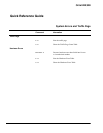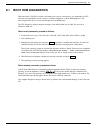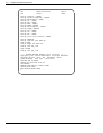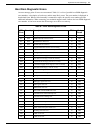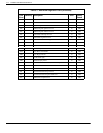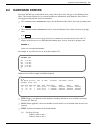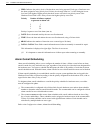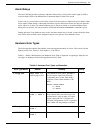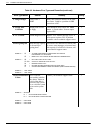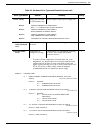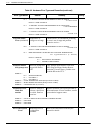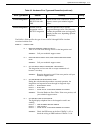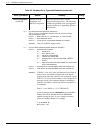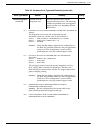
8-6 Installation and Maintenance Volume
Octel 200/300 S.4.1 PB60019−01
- PRIO. Indicates the priority level of the hardware error being reported. Each type of hardware error
has been assigned an error priority level. Priority levels range from 0 to 3, with 0 being the lowest
level and 3 the highest. Higher priority hardware errors overwrite lower priority errors if the
Hardware Error Table is full. Always correct the highest priority errors first.
Priority Number of failures required
to generate an alarm call
31
225
150
Priority 0 reports a test of the alarm (TE A).
- DATE. Shows the month and day the error was first detected.
- TIME. Shows the hour and minute the error was first detected, using a 24-hour clock.
- #BAD. Indicates the number of times the error occurred (up to 99 times).
- DATA1 – DATA4. These fields contain information used when an assembly is returned for repair.
This information is displayed as eight digits. The first six are zeroes.
. It is important to enter this information on a failure report when returning an assembly.
Alarm Outcall Scheduling
Alarm outcall scheduling allows you to configure the number of times a failure occurs before an alarm
outcall is made for every hardware error type, regardless of the priority level that has been designated for
the hardware error. You create a schedule that designates the time of day and day of week that an alarm
outcall should be made. With this feature, alarm outcalls for non−critical hardware errors can be blocked.
If alarm outcall scheduling is not established, outcalls to report system problems that are logged in the
Hardware Error Table are placed according to the the priority designated for the hardware error, with no
regard for the time of day or day of week.
To designate alarm outcall schedules to override the priority schedule for hardware errors, two tables
must be configured in update.
- The ALARM Table is configured with a failure limit for each hardware error and an alarm schedule
number to determine when an outcall should be made. The
ALARM Table can be configured to block
alarm outcalls for non−critical hardware errors.
- The ALARM SCHEDULE Table creates alarm schedules with outcall windows based on time of day,
day of week, and holidays. These schedules can be assigned to hardware errors in the
ALARM Table.
Twenty−five alarm schedules can be created with eight different windows. Each schedule can be
referenced by multiple hardware error types.
Refer to the Configuration volume, Alarm Outcall Scheduling.




